If parenting were film acting, we’d always be brilliant because we’d have plenty of “takes” to perfect our responses (not to mention make-up, hair styling and ridiculously high salaries). But we are playing a part — the role of a lifetime for a lifetime. Luckily, we perform for an adoring, forgiving audience, and our children will usually accept our less thoughtful, less than stellar performances. In fact, even our bloopers can be blessings, because they teach kids the invaluable lesson that mistakes are okay since even superstars like their parents make them.
Here are a few of my “Take 2” suggestions for handling common infant and toddler situations and some of the reasoning behind them…
1. Crying
Instead of “Don’t cry”, “Shhhh”, “You’re okay”, “Okay, that’s enough now”, “It’s alright, nothing happened”…
Non-judgmentally acknowledge the child’s response and the incident that caused it. “Ouch, that hurt you when you bumped into the wall.” Or “oh, you are very upset that the dog barked.” Or “You are having a hard time relaxing your body. I hear you.” Then allow the child all the time he or she needs to finish crying with your full support.
Encouraging children to express their feelings is the key to fostering emotional health. No matter how unreasonable our child’s reaction seems, he or she needs it to be accepted. Remember, even adults can’t control emotional reactions, but young children are not capable of controlling the manner in which they express them, either. Discouraging the feelings or responding impatiently invalidates the child. When you’re feeling impatient with a tantruming toddler, stay present, relax and imagine all the future therapy bills you’re saving.
2. Minor accidents
Instead of running over to the child and scooping him up in a panic…
Take a moment to observe his response. If he cries, go close to him as calmly as possible, ask if wants you to pick him up, acknowledge what happened (as explained above) and his feelings about it.
When we respond frantically, we startle our child, which can make him fearful or cause him to become upset when he might have quickly recovered and continued playing. Our little ones are very tuned into us and benefit greatly when we can trust their competence. Allowing children to recover autonomously whenever they are able to fosters self-confidence and resiliency, gives them an opportunity to try to understand what happened and learn something from the experience.
3. Praise
Instead of “good job”, “That’s beautiful”, “You are so smart!” or a big round of applause…
You might say, “Thank you for helping me!” “You did it all by yourself!” “You pulled the plastic beads apart. That was hard!” “You struggled and struggled, but you didn’t give up.” “You must be proud of yourself.” Add specifics so your child knows you’ve been paying attention (and to aid language development).
These responses encourage children to own their accomplishments, protect intrinsic motivation, and are less likely to train kids to depend on others for validation.
4. Encouragement when a child is struggling
Instead of “you can do it!”
“I hear you getting frustrated, but you’re almost there.” “This is hard work you’re doing!” “I’m here and I won’t let you fall, but it is safer for you to climb down yourself. Try placing one foot on the bar below.”
“You can do it” can be perceived as pressure and make the child think he’s disappointed us if he ends up not being able to do it. Giving a little verbal instruction helps children learn to get down safely after they have climbed onto something. Children usually can do this themselves, but by taking them down, rather than just spotting and providing verbal support, we lead them to believe they can’t.
5. Undesirable behavior
Instead of distracting, coaxing, bribing, shaming, scolding, punishing…
Handle with care, confidence, respect, brevity (save the lectures for another time). Whenever possible, acknowledge the child’s point of view. “You wanted ___.” Give a brief instruction (and an option if possible). “I can’t/won’t let you ___. That’s not safe” (or “It’s not time for that now”, etc.). “But you can ___.” Physically block the behavior if necessary. Acknowledge again. “I know you wanted ___ and I wouldn’t let you. That’s upsetting.”
Infants and toddlers need help managing their immature impulses and understanding our boundaries. They are not bad kids who need to be reprimanded, punished or “taught a lesson”. The most vital lesson they must learn is that their parents are always in their corner (rather than sending them off to one), and that we will calmly, consistently and patiently remind them of the family rules and prevent them from harming us or themselves. When we do this, children learn our expectations and internalize them with amazing proficiency.
6. Sharing
Instead of telling babies and young toddlers they must share or take turns…
Observe closely and calmly reflect (or ‘sportscast’) the situation and allow it to unfold. “Justin, you are holding the ball and Meredith wants it, too. Now Meredith has the ball.” Or, “Meredith are you asking Justin for the ball? Justin seems to be saying he wants to keep it for now. Maybe when he’s done. “
Infants and toddlers commonly socialize by taking and (less often) giving toys. From the child’s perspective it’s as if the toys suddenly come alive and become interesting when another baby is holding them. When we allow children to connect with and learn from each other this way, they may react negatively in the moment, but they are usually quite capable of working it out without our intervention. The big clue to the child’s perspective? After these little play tussles have ended, the desired toy is almost always left behind, no longer of interest to either child.
7. Learning language
Instead of correcting toddlers when they mispronounce words or use them incorrectly (for example, they call green “yellow” or a rabbit “a dog”)…
Don’t. It takes courage to speak words for the first time. Encourage your child to speak by treating him with the same respect you would a foreigner trying out English. If the child mispronounces a word, we can respond in a manner that provides a gentle correction. In other words, when your child points to the rabbit and says “bobby”, you could reply, “I see the rabbit, too!” If the child points to the rabbit and says “dog”, you could say honestly, “Yes, I see! That looks like a dog.”
When children begin using language, they are only able to say a fraction of the words they know. Chances are they know the difference between a rabbit and a dog but just aren’t able to express that yet. Trusting and supporting your child’s process means allowing him to be “right” as much as possible. And don’t forget to enjoy (and log!) your child’s creative use of language while it lasts.
Cut, print, that’s a wrap.
***
For the complete scoop, I’m offering my first (and maybe last) online master course! You can check out all the details HERE.
I also share many more suggestions in
Elevating Child Care: A Guide to Respectful Parenting and No Bad Kids: Toddler Discipline Without Shame.
And I recommend…
Pondering Praise by Amanda Morgan, Not Just Cute
What To Say Instead Of “NO” – Six Ways To Gain Your Child’s Cooperation by Lisa Sunbury, Regarding Baby
( A BIG thanks to Erin, Vanessa and Fran for asking me to make this list… Hope this is what you meant!)

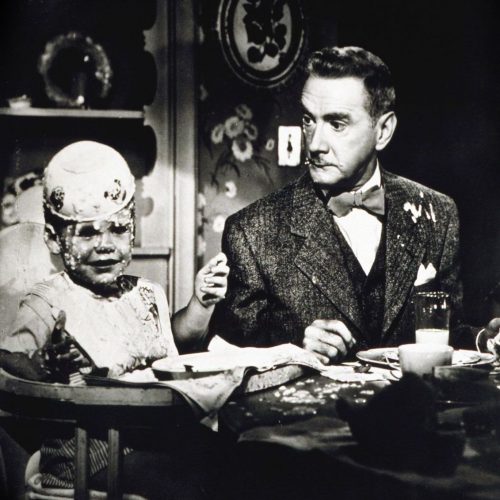

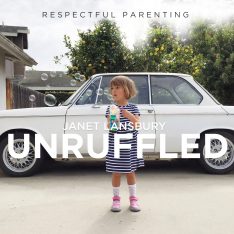


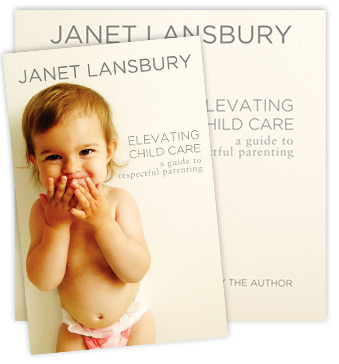

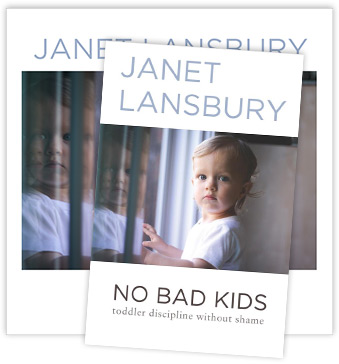
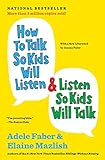

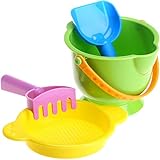
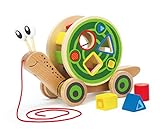

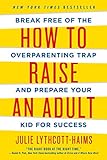
Thanks Janet for writing this. I’m a Parent Effectiveness Trainer and I loved the specific advice you give in your article! It illustrates the best way to tackle these situations so well.
Just posting the link on my facebook page too. 🙂
Thanks, Maryam!
Janet — thank you so much for compiling this list. I wish I could get every parent to read it! I have many less-than-stellar moments, but I’m trying. And when I fail, I apologize to my child!
Shanna, you’re so welcome…”failing” sounds like you’re being quite hard on yourself! I don’t think of this as being about failing at all, just understanding our child’s perspective and maybe a little fine-tuning. But thanks for reminding me about apologies…
Sometimes these situations might warrant an apology, but I think it’s more about acknowledging to our children when we are behaving differently than we might have done before. That’s really important. For example, parents in my classes commonly find themselves in the habit of helping children down from structures or catching them, which then can become a game, but it’s dangerous because we might not always be there in time. And the child immediately begins depending on the parent’s help (understandably) so the parent has to say, “I know I used to catch you, but I’ve learned it’s much safer for you to try to find your way down. I’ll spot you and not let you fall…. “
Thanks, Janet. It’s true, I’m very hard on myself! Perhaps “fail” is too strong of a word…just not always measuring up to my standards. I do realize there’s no such thing as the perfect parent.
And I appreciate the tip — I can see it being more useful to acknowledge that we used to do things one way, now we do them another than simply saying “I’m sorry.”
What a wonderful list, Janet. There are many times I wish I could go for the do-over. As well as the good advice, this is a nice reminder that we all have those moments. (Thanks also for the link love.)
Thank you so much for such nice advises:) I like them alot, these are really very helpful for giving confidence to the kids.
Wonderful list! I use a lot of these with the children at preschool and find them so effective (and less stressful on everyone), it’s just about changing your perspective. It’s so rewarding to see a child climb down a ladder by themselves when they initially believed they couldn’t. I’ve definitely noticed the forgotten toy too!
Great to get your corroboration “in the field”, Kerry!
When my baby hurts himself (all the TIME now that he’s crawling) my first, automatic response to tears is “shhh…” I debated with myself whether I should try to avoid that, but decided not to, because I’m not really trying to SHUSH him, I’m providing a soothing sound. I think. I feel the same way about the occasional “you’re ok,” because so many of the hurts are more fear than pain, maybe he needs to be reassured that he really is ok?
I also use “shhhh…” and feel the same way as you, it is more of a calming sound than a “be quiet”, at least for me. I think the tone and attitude one says it in is what makes a difference.
Thanks, Meagan, you bring up a great point… Our intentions with all of these automatic responses are 100% positive, but what Magda Gerber made me aware of is the child’s point of view. Young children are impressionable and literal. They hear their parents saying “You’re okay”, but they don’t feel okay at all or they wouldn’t be crying. They are not thinking about how they appear as we are (for example, if we see that our child isn’t red or bruised, we might think….”He’s okay”). The child is completely in the moment with what he’s feeling. “You’re okay” tells him that this feeling isn’t valid. And when we use “shhhh” or “you’re okay” we are usually also projecting discomfort and, very likely, impatience with our child’s emotion, which is very natural and normal for us to feel, but is definitely sensed by the child. The child gets the message, “My feelings make people uncomfortable”.
Hi Janet, not sure if you continue to read comments this long after a post, but I’ve been thinking about your response since I read it a few weeks ago, and wanted to reply.
I understand what you’re saying here, and it gave me pause. Ultimately though, with these specific interactions, I continue to respectfully disagree. I believe you are imposing an adult interpretation on my words (you’re ok = you should not cry). My son, at almost 9 months, is just starting to recognize certain words, and I believe he is capable of understanding both my tone, which is soothing, and the literal meaning of my words, which tell him that although he is frightened, may even have experienced pain, he is “ok,” not HARMED. My full litany when he cries sounds something like: “That was scary/looked like it hurt. You’re ok. You can cuddle here with me as long as you like.” And once he’s calm and starts showing interest in something, I’ll ask him, “Are you ready to play?” before setting him down. I think “shhh” is more questionable, and I’ll be more careful of it, but I’ve always thought of “shh” as a soothing noise as explained in Happiest Baby on the Block… Not as an impatient shushing. Still, I agree that this is a loaded “word” and will probably try to use it less.
The differences in meaning were really brought home to me this weekend, when I had family visiting. When my son fell, my relative immediately stepped in and told him, “You aren’t hurt! Stop crying!” The tone was aggressive and almost scornful, and that anyone would speak to an infant that way shocked and annoyed me. My son looked to me when this happened with a sad, “what is happening?” face. I absolutely believe he knows and understands what I am saying to him.
Thanks for sharing this experience, Meagan. Your family’s reaction must have felt very uncomfortable. 🙁 It sounds like you are handling your son’s hurts very sensitively and respectfully. “You’re okay” is often used with a bit of the tone you describe with your family…impatiently or fearfully and sometimes scornfully. So, I still think it’s unnecessary and a word to be careful about, but I respect your opinion and am really glad you shared it.
Something I use, and recommend to others (I serve as a consultant to early childhood educators) is “you’re safe” instead of “you’re okay”. I think it gets the message across that you’re trying to, Meagan – that the child is physically unharmed and perhaps is only afraid – without (unintentionally) shutting down the emotion. I think, especially for the children who have a better understanding of these words than a very young infant/toddler might, it serves as a reminder that they can rely on us. They fell down, but it’s not because they’re in a dangerous situation. They can feel safe to try again when they’re ready, knowing that we’ll be there to support them through whatever emotional reaction will follow.
I hope this made sense! Just wanted to give my perspective.
This article and this thread are so helpful! I like the use of “you’re safe” when the child is scared. Language is so important. Thank you.
Janet, have you ever read “Between Parent and Child” by Dr. Ginott and the related book “How to Talk So Children will Listen and Listen So Children Will Talk”?
I absolutely love these two books because they parallel most of what you try to teach here. Respect (of both the child and the parent), treating the child as a complete person in their own right, correcting behavior not feelings, and my favorite, not labeling but describing instead.
There is so much similarity between what you say here and these books that I always wondered if you knew about them.
Hi Kay! I haven’t read those, but have heard of them… Thanks for these suggestions for my ever expanding book list! And thanks also for your description of this approach…it’s perfect…
“Respect (of both the child and the parent), treating the child as a complete person in their own right, correcting behavior not feelings, and my favorite, not labeling but describing instead.”
Wow, any one of these 7 could have been a whole blog post! (okay, maybe just for those of us who think more words are always better…) Thank you for NOT making these responses to children more complicated than they need to be. They’re simple but SO effective if we practice them over and over. Happily, the effects of parenting (and teaching) are cumulative – what matters are the kinds of experiences children have over time. Good news for those of us who aren’t perfect… (P.S. LOVE the photo!!)
Kathy, thank you for your vote of support… I couldn’t agree more with this: “Happily, the effects of parenting (and teaching) are cumulative – what matters are the kinds of experiences children have over time.”
Thank you for this post! Last night after I used all my patience and zen-ness to work with my son to brush his teeth, he said, “Good job mommy!”
Apparently, I have been saying that more than I thought! This is a great reminder to get back on track and mindful of my responses.
Oh, Pamela, that’s classic! 🙂
Janet,excellent list. Thoughtful and respectful. I especially love the fact that you mentioned alternatives for the response as your child bumps his head or falls down…”you’re all right” has always intrigued me. I wonder how we knew….I love the alternatives…so respectful and real.
This is a helpful list. Just today, a child (7 months) rolled off a mat and was stuck on her back crying. We teachers helped each other to wait and see if she could return to her crawling. We encouraged her from a distance and she did it!
I appreciate other phrases to use when children are crying. I needed that reminder. Thank you.
This list is exactly what I needed to read today. I started the week with the goal to become a calmer parent but I think I only a made a a quarter of the way there. Reading this has given me a lot of ideas that I can use to help me. Thank you.
I’m really glad to hear that, Amanda!
What a great post! Thanks for some really great suggestions for more constructive responses to our children. I find that it is so hard to re-program ourselves to learn these kinds of new behaviors, especially in stressful situations (i.e. our kids are being unsafe or pushing our buttons). While I am trying to learn to say these kinds of things as opposed to the habits I learned from my own experiences, my rule of thumb is to try to start my sentences with “I”, like “I see that you hurt your foot” or “I need you to be safe” or “I see that you didn’t brush your teeth yet”. I find that it is one easy rule to remember and works in most situations.
Really great rule of thumb, Kelly… Thanks for sharing!
An interesting one is trying to avoid using “negatives”, like the ‘no’ and ‘do not’ words too much…or use them sparingly and only in dangerous situations (partially because the negation falls away in our subconscious).
Last week I overheard my mom say to my 9.5 month old “That is forbidden” (not in English, but the meaning is equivalent to this) when she was reaching for a plug in a socket, while she (my mom) blocked her (my daughter’s) hand from reaching it.
I realized I liked that phrasing a lot more than “I won’t let you touch the plug” or such.
Yes, I like that, too. Even better if her desire is acknowledged first… “You are reaching for that interesting looking plug.”
Agreed! If I remember correctly my mom acknowledged the interest after (during her second…and third…and fourth attempts), with something like “I see you really want to touch the plug”…”It is forbidden” 🙂
After I wrote the above I was thinking about it more, and I wanted to add that sometimes the “I won’t let you …” probably is most appropriate, for example when it comes to harming themselves or others.
I love it! Thank you!
Thank you!!! I think I am one of the parents who begged for this list! It is going on my fridge tomorrow!
It’s a good list. Giving someone else feedback on their action is a good way to respect them as a decision maker. Naming the action, naming the consequence. …and good for language development, of course.
i have quite a few of these posts printed and copied for my educaring portfolio. i wish it was easier to communicate these ideas to parents and care givers without them feeling shamed.
Hi Charisan! I’m sorry that either parents or caregivers could take these suggestions as shaming… To my mind these are little corrections to the most natural, reflexive and instinctive responses that many of us (including me) have… There is nothing shameful about it.
Hi Janet, I know this is an older post, but I was just reading it, and I had a question in regards to point 6 and sharing: what do you do when you’re in a class or at the park, and the other child’s parent jumps in to say “share” or “give the toy”. I always feel a bit of pressure to do the same in that situation, in the classes we take, few parents are actually ok with being mostly hands off with minor conflicts among toddlers… Any tips or advice?
Helene, this is a tough one! And a favorite topic of discussion in my RIE Parent/Toddler Classes. I don’t really have the perfect answer… Here are some of my ideas (and please check out the comments, too!): https://www.janetlansbury.com/2011/03/dealing-with-parenting-differences-among-friends-family-and-kind-strangers/
Thanks so much, Janet, some good points in there. I’ll need to keep practising good ways to handle it. I think some of it also comes from me feeling some fear to be judged by the other parents, which I should let go of, as the key thing is what I’m teaching my son. Thanks as always for all your wonderful insights. Your blog is truly an invaluable ressource.
THanks Janet! I was searching for a ‘printer friendly version’ of this on the webpage. So great! I’ve copy and pasted the text and printed it out for frequent review and reminding! It all resonates so well with me and my little boy. Much appreciated!!!
You’re most welcome, Lisa!
Such a wonderful post (as usual)! I love reading about these concepts, but it is especially helpful (as someone new to both RIE and to motherhood itself) to see examples of how to more effectively handle common situations. Thanks!
Subtle differences in response, but a big shift in attitude. Thank you for this.
My pleasure, Laura. It was actually fun to write these thoughts down.
Loved most of this, but wondered about when you suggested saying “You must be proud of yourself” to children. I don’t (or try not to!) suggest how they should be feeling in other areas of their life, why should I in this way?
Great point, Rachel! Thanks for the feedback.
I mulled over that one for an extra moment myself, Rachel J! But I concluded that while “You *should* be proud of yourself” might be inappropriate, “You must be proud of yourself” might be just me reading my daughter’s expression in context – just like saying “You must be so sad that Daddy had to leave”, or “You must still be really angry about my taking away that interesting thing you found on the floor…”, which I often do say after observing her. When she grins and claps after finishing a puzzle, I think it’d be perfectly reasonable for me to say “You must be proud of yourself!” as a kind of “sportscasting” move describing what I see, not a suggestion on how she *should* feel.
A mind opener article. Thank you
My pleasure, Melike
Hi, Janet.
I’m from Brazil and I realy love your posts. I try to use your advices but I’m having a hard time. My 23 months son is a very smart toddler but he has a delay in his motor’s skills. He talks to me like a 3 year old child but he can’t run or jump or climb stairs. Today He has a sprained ankle for for the third time at the same side simply falling in to the ground. I’m realy worry about his self esteem because he said to me: “I’m afraid to falling down!”. What can I do? I’m very tired and very upset now… Please help me!
Hi Ludmila,
I’m assuming his “delay” has been diagnosed? If not, I recommend getting a doctor’s assessment. I’m unclear as to whether he is falling unsafely because he has medical issues or if this is something I can help you with. I would always say not to minimize his feelings. If he says he is afraid, acknowledge “You are afraid about falling” and “spot” him if you can. “I will be here to to keep you safe if you want to try climbing”, etc. I’m also unsure as to what you mean by “he can’t run or jump or climb stairs.” Does he attempt these things?
Dear Janet, he was diagnosed with a small degree of muscular hypotonia by ligamentous laxity, is benign and tends to heal with growth. This leads him to do things in his time and makes it gangling. His language and fine motor skills are very developed for his age. He only climb stairs holding my hands. My concern it’s about his feelings like be afraid to fall… Thanks for your answer.
Hi Janet, I’m a big fan of your site. In #7. you say that we shouldn’t correct if they call green ‘yellow’. How would we know if they have just said the wrong colour, but actually know that it is green, or if they are still learning colours, shouldn’t we help them state the correct colour?
Thanks, Michelle! As a general rule, if he’s not asking, I wouldn’t correct him. But if he’s consistently confusing two colors, I might give a gentle, casual correction… “That color is actually called ‘green'”.
Do you think this list of dos/don’t goes for 7 year olds as well? My kiddo is struggling with confidence and anxiety about trying new things. We praise him and encourage him to try but it doesn’t seem to be helping. Not sure what else we can do but seek professional counseling for him.
Any advice would be helpful. Thank you.
I have a question regarding #2: at a friend’s house recently a 2.5 year old boy was running in the yard and fell a few times on the brick pathway. He began to cry and noticeably looked toward the area where the adults were sitting (to see how we would react to his fall?) and his parents asked everyone not to look at their son even though we all felt the natural reaction to see if he was ok. He ended up not crying and getting up to shake it off but was noticeably upset and scraped up. While I understand not making a big deal out of it this seemed to take ignoring his feelings a little too far. I have a baby girl who is not walking yet so id like to know how you recommend dealing with children’s falls. Somewhere in the middle of not making a big deal but being there for support nonetheless regardless of the child’s gender I am guessing? Thanks in advance 🙂
I think the non-response of those parents was bizarre and sad, Celine. I would never, ever ignore a child. I certainly hope no one reading here would perceive this advice in such extreme terms… as if the only choices were to overreact or ignore!
If a child falls, I would observe closely and respond immediately… “I saw that! You fell… are you okay?” If the child obviously isn’t, “Ouch! That hurts”… going close to the child and being available for a cuddle…
I have two grown sons 23 and 35. They both turned out pretty good in spite of me. How i wish that the internet and you were around when I was making all my mistakes as a dad. You are obviously benefiting a lot of young people now. Great job.
God bless,
David 🙂
hi there, thanks for all your articles, words, books and inspiration. I have been following your work since my 2.5 year old daughter was born. The problem i am having now is that she finds it very difficult to let other children do what they are doing, so if a friend is here with her child and they pick up a toy, my daughter will either shout at me saying, ” i don’t want them to do/have that” (she does this all the time about myriad things, i.e. sees a boy in a buggy and says, “i don’t want him in the buggy i want him to walk” etc) or she just wants to take the toy they are playing with. I have been doing the commentating thing and just letting them sort it out but recently most of her other friends are at nursery and seem to have learnt all this stuff there, where as my little one seems to be almost a bully or controlling or difficult in comparison. Any advice would be appreciated.
Thanks
Lisa
ps when she’s got complete ownership of a toy and is doing a “good job” at defending it, should i then suggest that she shares? its usually the other way around where she approaches the toys other ones have and just doesn’t want them to play with anything it seems, but on one or two occasions its been the other way around.
Hi Lisa! Thanks for reading my books and articles! Have you listened to any of my podcasts? I think some of them would be particularly helpful. I’m interested to know more about how you are doing the “commentating thing” 🙂 Because if you have a slight tone of annoyance or
I feel relieved that my child is normal; I cry some nights thinking and praying what can I do to help this child listen and not give up on himself.my parenting skills wasn’t working; but thanks Janet for writing some awesome books.
Hi Janet! I have been reading your books and blogs for years and they have been a great help to me. Thank you. My son is four and he has some fears associated with steps and ladders. Regarding the part where you suggest ‘ Instead of “you can do it!”…I hear you getting frustrated, but you’re almost there…This is hard work you’re doing…I’m here and I won’t let you fall, but it is safer for you to climb down yourself. Try placing one foot on the bar below.”’ – What if my child does not want to try placing one foot below? When I do this my son seizes with fear and cries and reaches for me. Should I wait beyond a few minutes and then pick him up? Or should I be waiting much longer until he tries the steps himself?
I just wanted to add that he can climb up and down steps but just does not do it consistently. We had his eyes checked and there might be issues surround depth perception but the doctor said he does not need glasses and will eventually adjust. I just wanted your thoughts on how to most respectfully encourage him without adding to his anxiety. Thanks again.
Hi Neh! I wouldn’t push this learning at all. Just nonchalantly give him the choice (assuming you have the time for him to practice his skills). If he says “no” to doing it himself, gladly pick him up. That’s the best way to encourage. Trust, wait, don’t push.
Hi Janet – Thank you so much for your reply. It helps. I really appreciate your time.
Hi Janet,
This is a. Excellent list, thank you for all that you do and the guidance that you give!!! How would I handle my 3 year old taking toys and food from my 10 month old? He always does this and I’m not sure how to handle it.
Also, how do I handle my 3 year old when he is constantly yelling at our 10 month old because the baby is in his space or going after his toy, etc? I feel like I’m a referee alllll day and it’s wxhausting! Also there are times when my 3 year old gets angry and screams at the baby or pushes his hand away or swats at him. I go over rules of the house quite often , and when he gets a little uncontrollable I usually take him to his room and explain to him that when he’s calm and Abel to be kind and gentle then he can come back and join us. He usually gets angry and throws things in his room or opens and slams his door 10 times or kicks it. I don’t feel like this is the best way to handle it but I don’t know what else to do? Thank you!
What about when you have no idea why they are crying? As an example, my 3 year old will wake up in the middle of the night crying uncontrollably and it only seems to get worse when I tell her I see she is upset and I am there in case she needs anything. Many times she hits or tries to hit me if I get close.
Thanks, Janet. Do you think this can be re-implemented after we’ve ‘fallen off the wagon’? I used to follow these and more of your advice, but since baby #2 came along, my toddler is really pushing boundaries and I’ve been in survival mode which often leads to less respectful, authoritarian reactions and more yelling than I’d like to admit because toddler just isn’t listening. I know this old school style of parenting isn’t promoting listening, just instilling fear or threats that make behaviours occasionally change (i.e if you throw that toy no ice cream tomorrow, and other forms of taking things away) and reinforcing negative behaviours (as well as modelling them).Can parents get a bigger do-over and repair their relationship after such a big change? Do you have a blog about this and where to start, if so? Thank you!
Absolutely! We can shift our dynamic with children at any time. It’s takes self-compassion, courage and commitment. Here’s a post that I hope will be helpful: https://www.janetlansbury.com/2013/08/repairing-relationships-with-our-children/